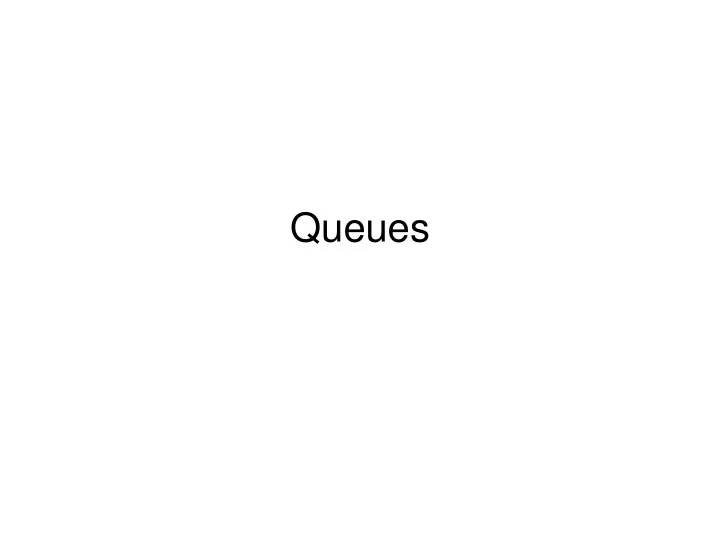

Queues
What is a queue? First-in first-out data structure (FIFO) • New objects are placed at rear • Removal restricted to front • Examples? •
Queue ADT Operations • enqueue (o): Insert o at rear of queue – Input: Object; Output: None • dequeue (): Remove object at front; error if empty – Input: None; Output: Object removed • size (): Return number of objects in queue – Input: None; Output: Integer • isEmpty (): Return a boolean indicating queue empty – Input: None; Output: Boolean • first (): Return object at front without removing; error if empty – Input: None; Output: Object
Example • enqueue(5) • enqueue(9) • enqueue(3) • enqueue(7) • dequeue() • size() • enqueue(7) • enqueue(3) • dequeue() • enqueue(5) • front() • dequeue() • dequeue() • dequeue() • isEmpty()
Queue Interface int size(); bool isEmpty(); Object front() throws QueueEmptyException; void enqueue(Object obj); Object dequeue() throws QueueEmptyException;
Underlying Representation • Array versus Linked List – Pros and cons? • Running time? – size – isEmpty – enqueue – dequeue – front
Array Implementation 0 1 2 3 4 5 6 … n-1 enqueue(5) 5 3 enqueue(3) 0 1 2 3 4 5 6 … n-1 dequeue() ?
Array Implementation 0 1 2 3 4 5 6 … n-1 enqueue(5) 5 3 enqueue(3) 0 1 2 3 4 5 6 … n-1 3 dequeue() ? 0 1 2 3 4 5 6 … n-1
Circular Array f r 0 1 2 3 4 5 6 … n-1 • f – stores index of cell which stores first element of queue • r – stores index of next available cell in queue • Initially, f = r = 0 • How do you add a new element? • How do you remove an element?
Circular Array f r 0 1 2 3 4 5 6 … n-1 • How do you add a new element? – insert at array[r] – increment r • How do you remove an element? – return array[f] – increment f • What happens when r >= n-1?
Circular Array r f 0 1 2 3 4 5 6 … n-1 • Need to be able to wrap around • Modulo – % – increment f using (f+1)%n – increment r using (r+1)%n
Circular Array f r f dequeue 0 1 2 0 1 2 f r r f r =(2+1)%3= 0 enqueue enqueue 0 1 2 0 1 2 f r enqueue 0 1 2
Algorithms size • return (N-f+r) mod N – isEmpty • return (f == r) – front • if isEmpty then throw QueueEmptyException – return array[f] – dequeue • if isEmpty then throw QueueEmptyException – temp = array[f] – f = (f+1)%N – return temp – enqueue • if size == N-1 then throw QueueFullException SIZE MUST BE < N-1 – array[r] = object – r = (r+1)%N –
Deque • Double-ended queue – insertFirst – insertLast – removeFirst – removeLast – first – last – size – isEmpty
Example • insertFirst(3) • insertFirst(5) • first() • removeFirst() • insertLast(7) • last() • removeFirst() • removeLast()
Doubly Linked List Object1 Object2 Object3 prev prev prev header trailer next next next • Algorithms – insertFirst – removeLast
Exercises • Implement a queue using two stacks. • Implement a stack using two queues.
Recommend
More recommend